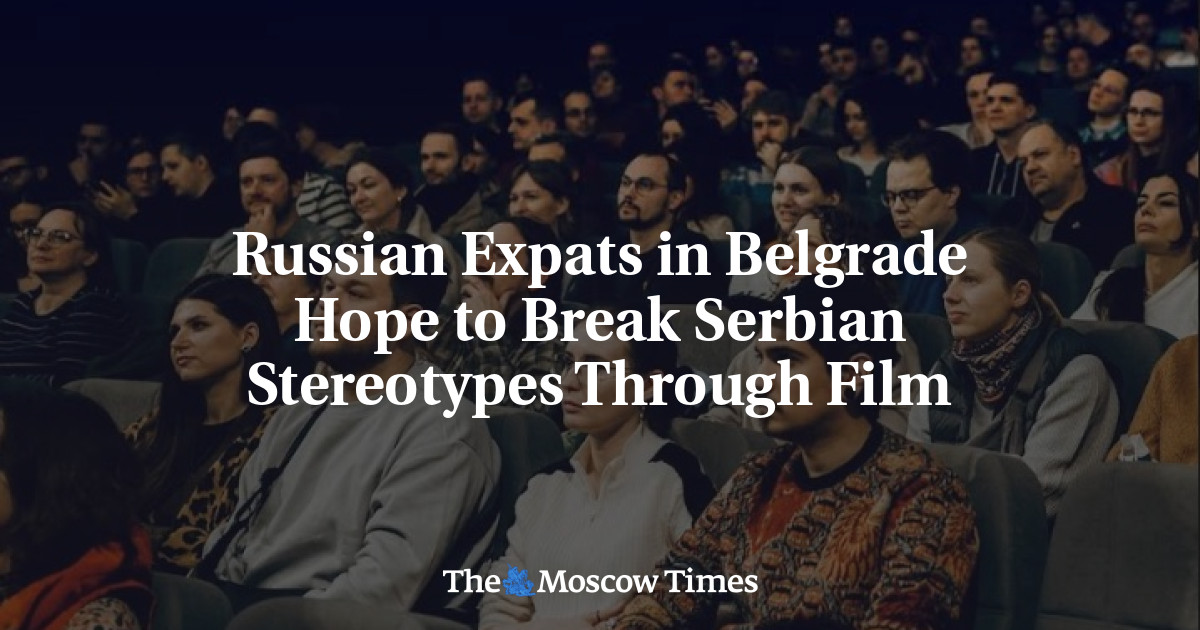
It’s been almost two years since Russians began migrating to Serbia, which is now home to one of the largest Russian war diasporas, totalling 370,000 by the end of 2023. Yet the community still largely lives in a parallel world of their establishments — bars, restaurants, music nights and art exhibitions. In an attempt to bridge this gap and foster connections between locals and the diaspora, the Quotes bilingual Russian-Serbian film festival was launched last weekend, and will continue through Sunday January 28.
Organized by the Belgrade Culture Сenter and DrugDrugu Kino, a Russian cultural organization comprising artists and actors who relocated after the war, the Quotes festival shows five Russian films and five Serbian films, all subtitled.
Co-organizer of the Quotes festival, Anna Gorelik, said the aim is to use film “to give a deeper look at each other’s culture, show Serbs Russian culture beyond the stereotypes of balalaika, vodka and violence, and to show Russians a version of Serbia beyond stereotypes of Balkan music and exuberance,” she said. “The movies we have chosen are iconic, but try to show something sincere, not follow state interest or propaganda.”
She added that, “It’s also an important festival for Russians who want to get rooted in Serbia. We have big boots to fill from the rich artistic legacy our predecessors [White Russians escaping the Bolsheviks] left a hundred years ago.” She said the festival is small in comparison to the churches, music schools and ballet companies built by migrants after 1917.
Heading up the festival’s Russian program is Alexei Agranovich, who became artistic director of Moscow’s avant-garde Gogol Center after director Kirill Serebrannikov was arrested in 2021. The Center was closed by the authorities in June 2022, but not before it was able to stage a defiant final show “I Don’t Take Part In War.”
For Agranovich, learning the context behind each film is key to understanding his new home. “When Gogol Center was shut down, I came to Serbia and asked friends to recommend some iconic Balkan films. But I didn’t understand why these films were so important to people here, so I tried to find out more about the milieu that created them. The films we’ve chosen on both sides are designed to reflect important points in each other’s history.”
To this end, each screening is bookended with history and a Q&A. In one screening, producer of the Russian film “Boomer” Sergei Chliyants addressed a packed auditorium to talk about the collapse of communism and the rise of Russian gangsterism in the 1990s, and how this led to Russia today. Actor Alexander Pal described the balance of grotesque in “Boomer” and the so-called “Russian soul,” shown mercilessly in the film.
Other Russian films include the WWII romance “The Cranes are Flying” and the 1966 comedy-drama “Watch Out For Cars.”
Last weekend the famous Serbian director Radivoje Andric spoke about post-Milosevic urban Serbia, the context to his hit film “Munje” (“Dudes”), to be shown on January 28. Audiences also saw the 1990s Serbian wartime film “Balkan Cabaret” and the 1980s Yugoslav espionage thriller “Balkan Spy.”
The festival is sponsored by Yandex, a Russian equivalent to Google, which opened two offices in central Belgrade for the over 4,000 research and development employees who left Russia after the war.
Yandex company representatives declined to comment, but a Yandex employee, who got free tickets to the event, told The Moscow Times he thinks it’s part of employee ‘loyalty’ perks and an attempt to integrate the mainly Russian Yandex workforce into Serbian culture.
The problem is not that Serbs don’t like the influx of Russians. To the contrary, as a Serbian filmgoer named Djordje told The Moscow Times at the Quotes festival, “We think of Russians as our Slavic Christian Orthodox brothers, we admire the country for being strong and standing up to the West. We know Tolstoy and Dr. Zhivago and Putin, but maybe we don’t know so much about modern Russian culture beyond that.”
Gorelik, from DrugDrugu Kino, said: “Serbs have a positive prejudice because Russia forced its narrative onto the Balkans and they have a fairytale version of us. But through films and theater we want to show real people, not those they imagine.”
Indeed, over 60% of the population express admiration for Putin and support the Kremlin’s narrative of Ukraine. The current Serbian government under Aleksander Vucic maintains friendly ties with Moscow, much to the concern of the EU, where Serbia is a candidate nation.
On the other side, Russians often knew little about Serbia before arriving. Some admitted to checking online to see if the country was still at war or if it was an Islamic country with restrictions on dress and alcohol.
Since moving here, Russians have described feeling welcomed by Serbs who call them brate (“brother”). But many feel that Serbs expressing their love for Putin are at odds with the diaspora’s generally anti-war stance.
Events like the film fest provide spaces for Serbs to speak with the largely anti-war Russian diaspora. While pro-Russian sentiment still remains high in Serbia, doubts about Putin may increase as Serbs have more frequent contact with Russians who left home for political reasons.
Screenings continue January 26-28 with Serbian black comedy “Marathons Run the Circle of Honor” (1982) by Slobodan Šijan, “Feather Collectors” (1967) by Aleksandar Petrović and the Serbian hit comedy “Lightning!” (2001) by Radivoje Raša Andrić.
Russian titles include “ASSA” by Sergej Soloviev, and “Wedding!” by Zhora Krizhovnikova.
Tickets can be purchased at the box office in Belgrade Culture Center (Кнез Михаилова 6 Коларчева 6).
For more information, see the site here.





